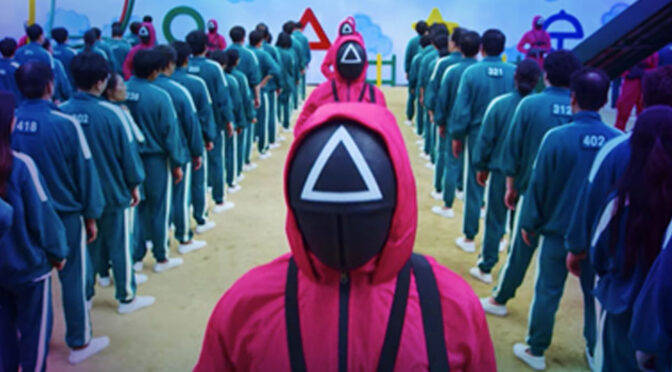The Squid Game: Our Lives in a Cimematic Nutshell
Posted on : March 19, 2022Author : Olivia Bannerjee

Abstract: Keeping in line with the anticipated standards of Korean drama, Netflix’s The Squid Game renounces the set expectations with riveting and thrilling creations by Hwang Dong-hyuk. But more than the cinematic representation, allegorically the series outlines what our modern society is based upon, social hierarchical exploitation. The critique offers deeper revelations of the nuances highlighted by the director, standing out as a successful first mainstream media attempt to critique the ongoing political danger through his cinematic representations.
Netflix’s recent series, The Squid Game, holding a viewership of 1.65 billion hours in just 28 days of its release, is much more than its bright pink and green optical aesthetics, ensemble cast, beguiling music or its influence on the global pop culture through, memes, reels, or Instagram filters. Director, Hwang Dong-hyuk has gained prominence, in successfully utilizing the mainstream media for the first time to denounce structural disparity in modern life by concentrating the huge resource base in the hands of a wealthy minority, who ignore the suffering of the wider toiling masses.
The world has been under the grip of a wealthy minority, the uber-rich billionaires, who completely surrender to the present White supremacy. While fascism could be theorized by the far-right, authoritarian, and dictatorial power, pluto-fascism brings a dual influx of totalitarianism along with the periodic subjugation of voices of the ‘other’. The non-whites, categorized as the ‘other’, predominantly the East, are forcibly suppressed of their voices for the benefit of the billionaire circle.
Set in this context of new-age pluto-fascism, the series uses metaphors of contestants forced to participate in a deadly competition of children’s games, to win a huge cash prize, to depict life-threatening struggles to overcome hardships of everyday life.
As Dennis Redmond mentions in his article, it is the pictorial depiction of society through metaphorical manipulation (2021). Netflix’s The Squid Game derives similarity to our childhood rhymes, which was deemed literally, a fairytale, but enveloped similarities with the present world structures, allegorically. It shows an advanced capitalist regime functioning under post-2008 pluto-fascism, like Trumpism in the United States, whose procedural goal is to entitle huge access to economic wealth and power to three thousand billionaires of the world, sustained through the periodic impoverishment of the lives of 8 billion humans working under them. The series of nine episodes views the deceit of imperial masculinity sanctioned by Pluto-fascist movement and the unwilling, yet unknowing perpetual by their victims, who represent common people.
It lends a spine-chilling reminder of the deadly brutal competition we pit against other fellow humans, for the sake of mere enjoyment and exploitation of the world runners. The brutal, gore and blood filled competition of children games in the series, shows that each hurdle passer gets closer to the humongous prize money, while the loser is plucked out like a weed, breeding fear, mistrust and chaos among the participants themselves. Technological development in such a ‘modern society‘ thrives on such an unhealthy competition for the sake of profit margins and ‘progress’, resulting in disintegrated social communities. In the series, the henchman’s constant reminder of the fairness and equality maintained in the game, lends a deeper revelation on how the world political makers boasts of running their government without any form of discrimination, but actually thrives on manipulation and curbing of transparency and dissent, just like the contestants in The Squid Game, who were misinformed with alterations were solely decided by the controllers. The tyrannical social hierarchies get perfectly represented in Dong-hyuk’s creation. The law and order remains perfectly delusional, where the commanders decide the rules, punishment and reward, but the onus of fair play lies on the shoulders of the bottom line inhabitants.
The sets of the game in the series make a cautious attempt to represent the systemic structures, and allude to earlier dissidences in media to corporate rule. The guards had different marks to represent their status in the prescribed ranking of The Squid Game system (lower level officers were marked by triangles, while the highest rank holders had a square). The background manipulation with symbols of triangles, circle, star and umbrella is the director’s special mention to the art of protests. The triangle and the circle were clear depictions of Sony’s Playstation video game controllers, the first media form resisting global plutocratic movements. The star hints on to Nintendo’s Super Mario franchise (1985), a collective for power-up grants for contestants. Finally, the umbrella alludes to Capcom’s hit Resident Evil (1996), whose players battle against the fictional Umbrella Corporation’s autocratic regime. The context of children’s games in this series, thus largely alludes to video games, which were born as a first tool of resistance to the rapid technological ramifications and exploitations in modern industrial society.
As the series progressed, the competition turned brutal and deadly. Violence erupted, relationships fractured, infusing a complete disappearance of systematic viciousness from their consciousness, which originally pitted one against the other. Communications disrupted and sensible participants tried to remind themselves, that the game was created to rouse the worst in contestants, who have no stake. The contestants try to break free from the game, from their impending risk on life if they lose, but eventually are forced to return and compete reflecting the systematic inequality already in place in their everyday life. Much like how each corporate venture traps people in disdain, through contracts, where the employees are exhausted through pressing work hours, but cannot escape the contract, as the circumstances are equally, if not more dangerous outside.
The last scene, probably reverberates the catastrophe we are unknowingly living today. When Gi-hun, the protagonist, comes back home winning the dangling cash prize, he finds his mom lying dead on the floor. This spine-chilling depiction draws similarity to today’s technologically modified society, where workers are deprived of basic rights of leaves for family care, or personal health concerns, and in the name of ‘development’ detached from their community completely.
The director wrote it around 2009, during the time of the Great Recession, a significant period of decline in the world economy. He categorically used the space to critique modern society thriving on exploitation of the toiling masses. The release time, during the pandemic is also significant. The reality of advanced capitalist society that the series is set to represent, gains a better clarity during the pandemic , when the world’s ten richest men added a billion dollars to their bank balance (Oxfam International, 2021) while the rest suffered from extreme poverty, unemployment, helplessness and terrible anguish. The socio-economic gulf which widened during the pandemic was beautifully portrayed in The Squid Game. There is a larger irony in the portrayal of the series in Netflix. Netflix is another capital monopolising market in the field of subscription streaming and production business. Right after the release of the series, the viewers widely resonated to it, and boosted its visibility and market. This in turn, made Netflix amplify its stock market by $19 billion (Bloomberg, 2021), trapping such an art of resistance into this periodic loop of profit making. This is in line with Herbert Marcuse’ theory of exploitation in advanced capitalist society, and negation of the critical lense of humans (One Dimensional Man, 1964). As part of this an anti-corporate production, was released and commodified by a mainstream streaming monopoly, like Netflix, to construct their path of increased return making The Squid Games lose the very essence of its creation. It could well be argued that an artwork, meant to throw a challenge at the current world politics and economic system, was utilised by a profit-centric organisation for their own retail success.
References
Rachit Sharma, ‘Squid Game’ – The Story Of Human Society With No Clothes On, Youth ki Awaaz, November, 2021.
https://www.youthkiawaaz.com/2021/11/squid-game-the-story-of-human-society-with-no-clothes-on/
Dennis Redmond, Plutofascism and The Squid Game, Groundxero, January, 2022.
https://www.groundxero.in/2022/01/25/plutofascism-and-the-squid-game/
Alan Sepinwall, We Have Seen the Enemy in ‘Squid Game’ — and It Is Us, Rolling Stone, October 2021.
Paul Cudenec, Antibodies, Anarchangels and Other Essays, Winter Oak Press, Sussex, United Kingdom, October 2013
Thyagaraju Adinarayan, Netflix Stock in Winning Spot Month After ‘Squid Game’ Release, Bloomberg, October 2021.
Marcuse, Herbert. One-dimensional Man: Studies in the Ideology of Advanced Industrial Society. Boston: Beacon Press, 1991. Print.
Olivia Banerjee
Intern, Asia in Global Affairs





Leave a Reply